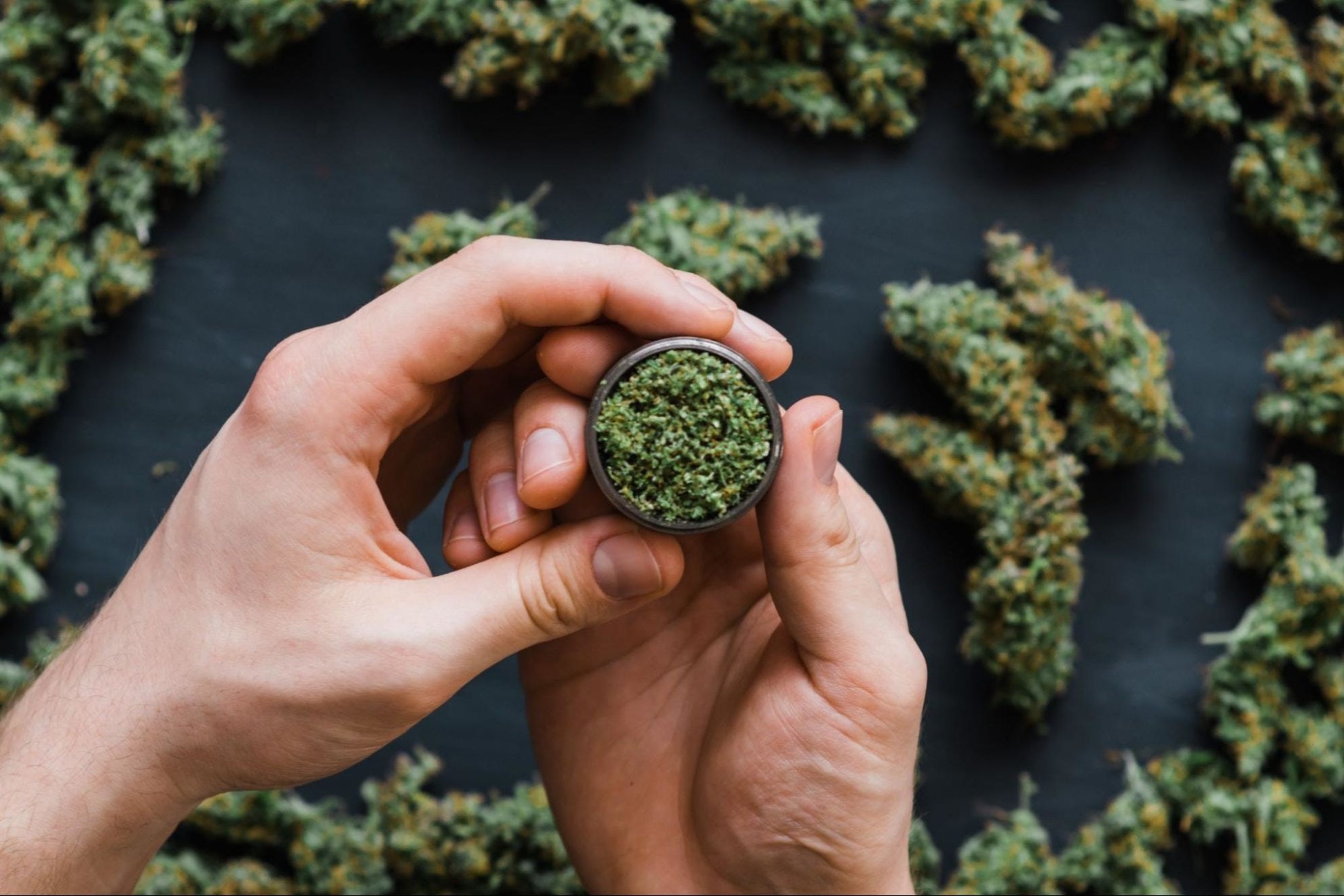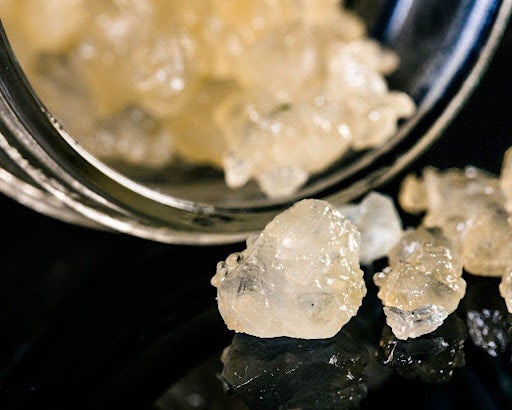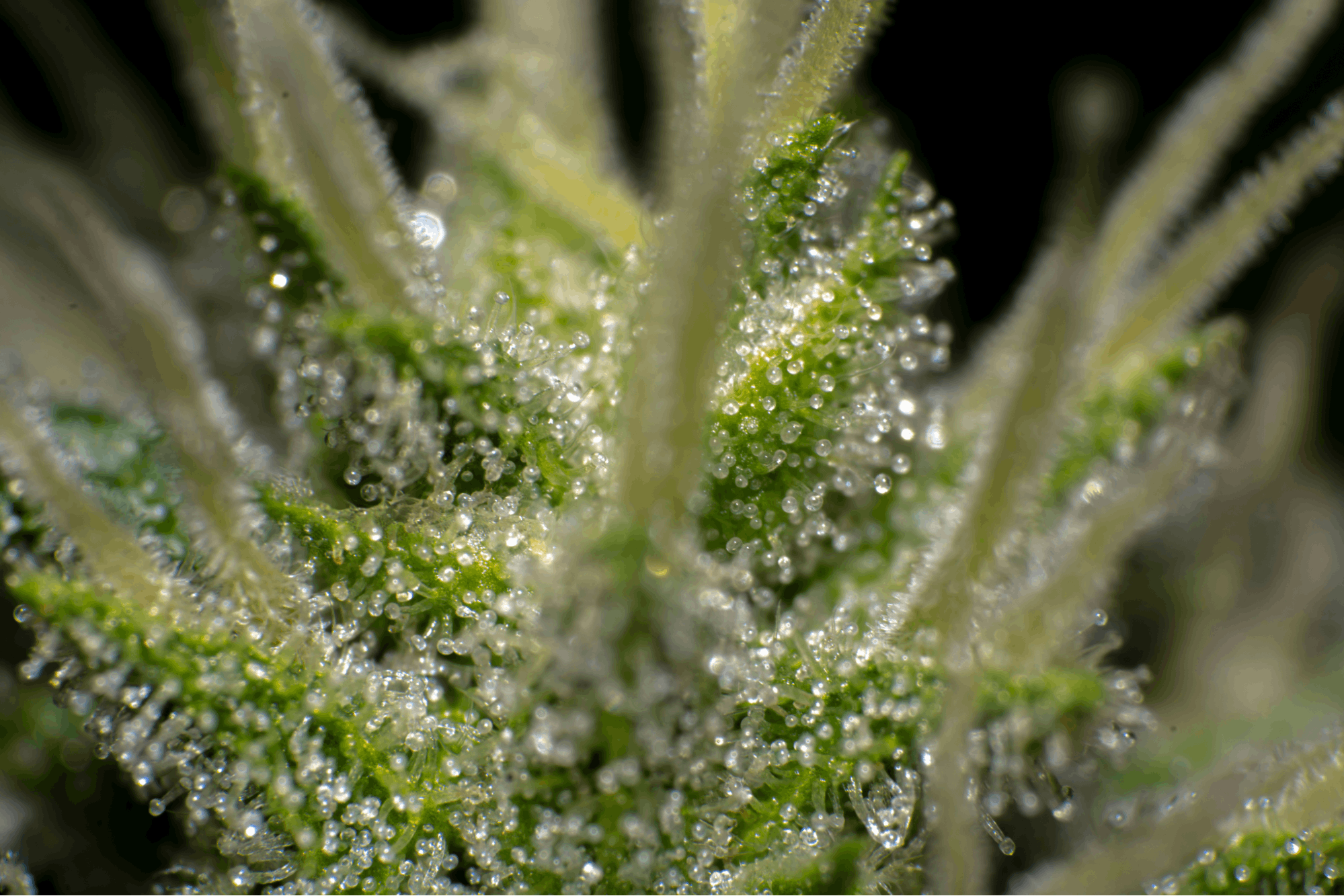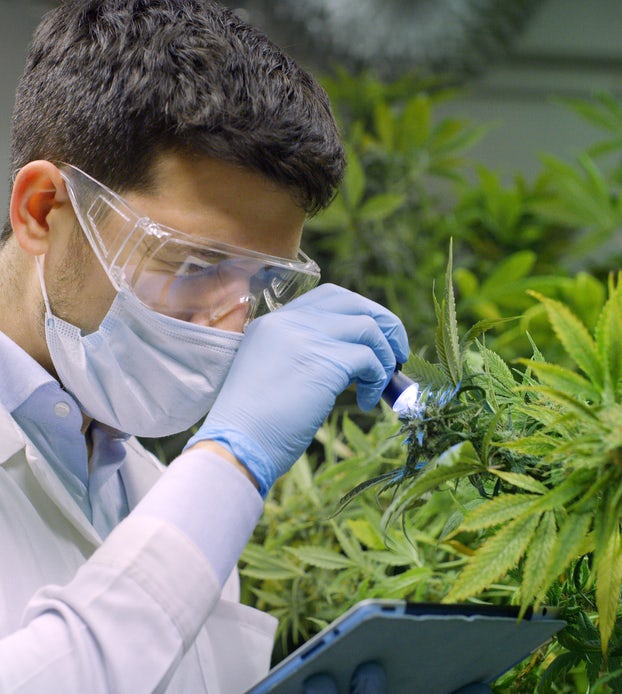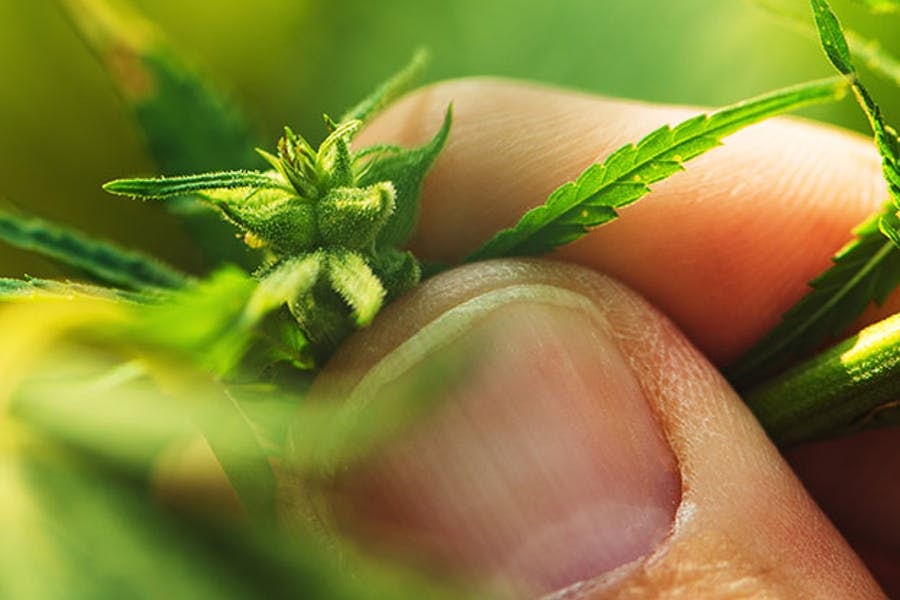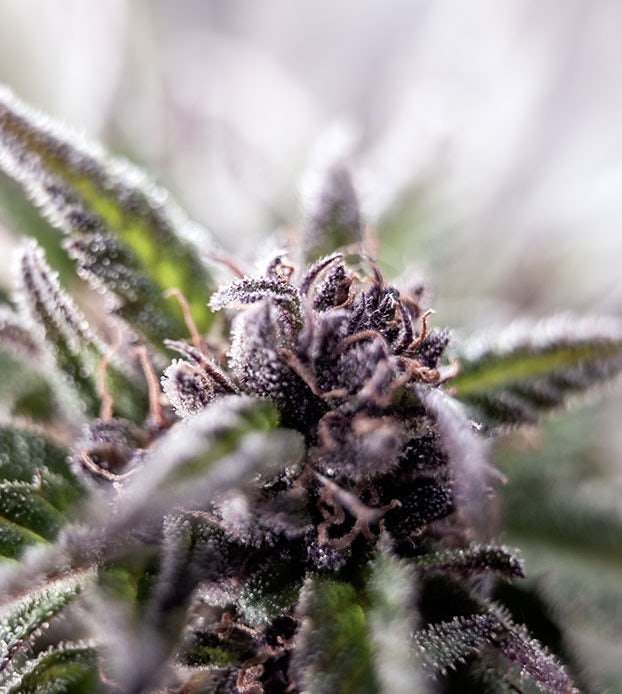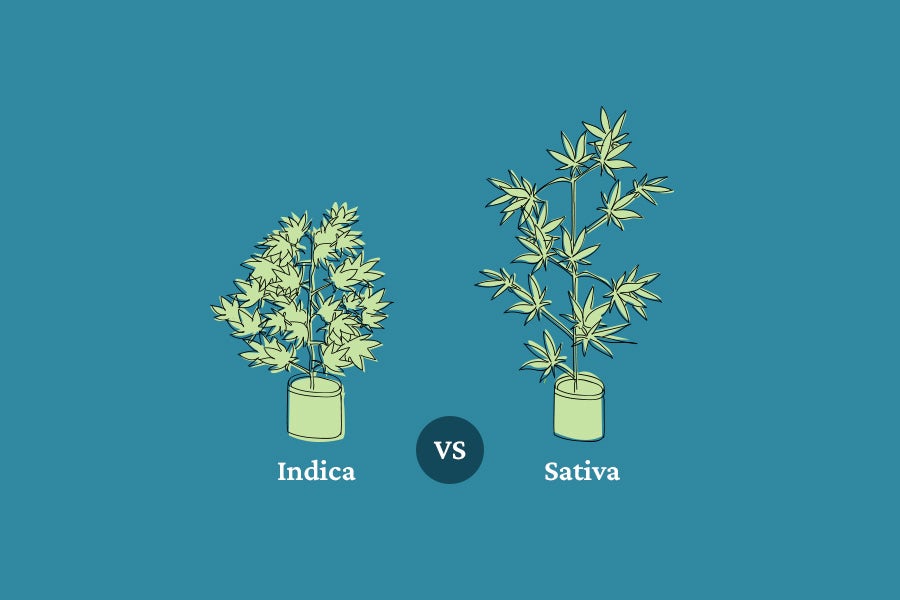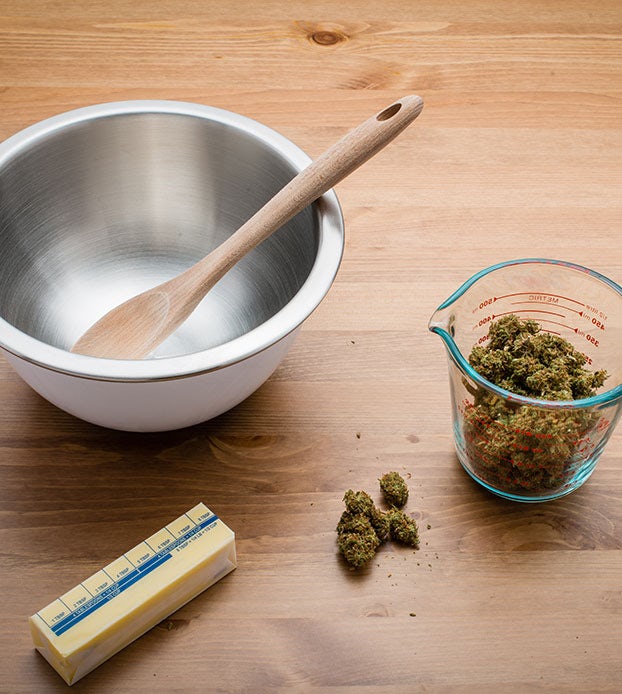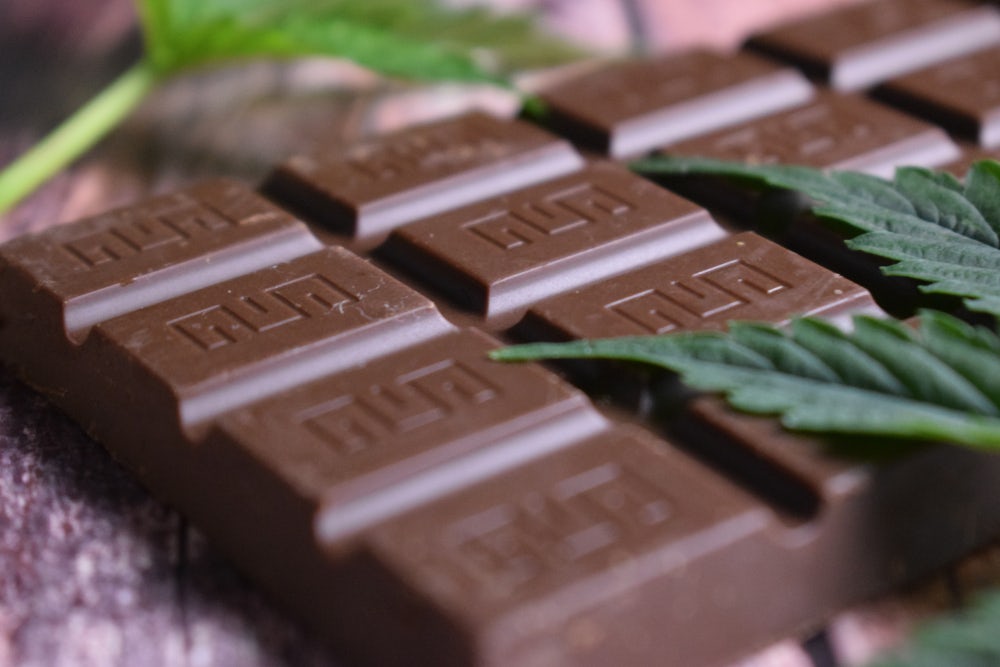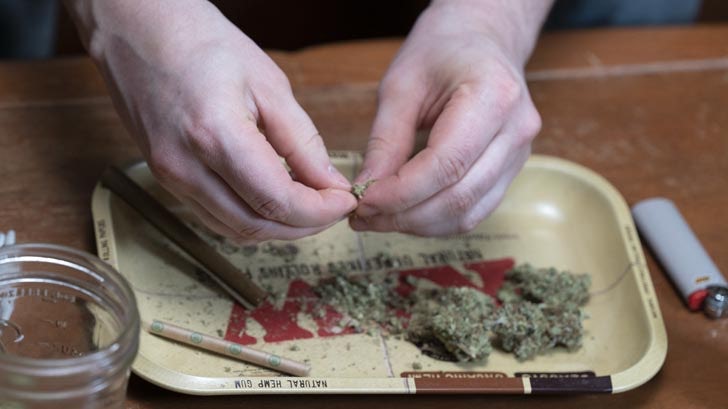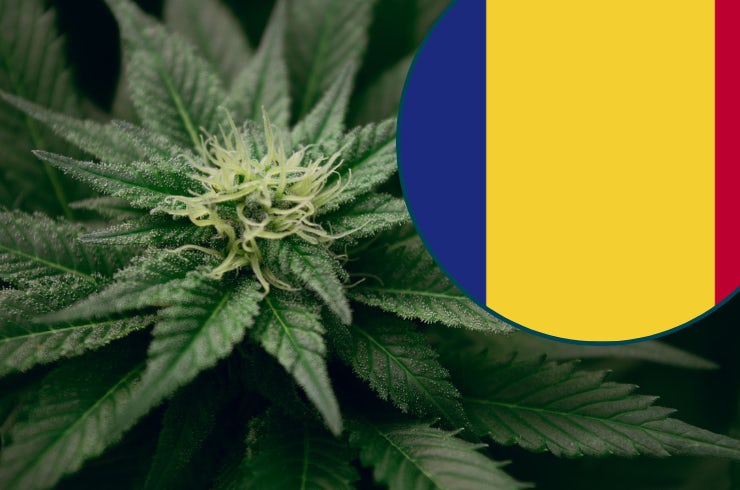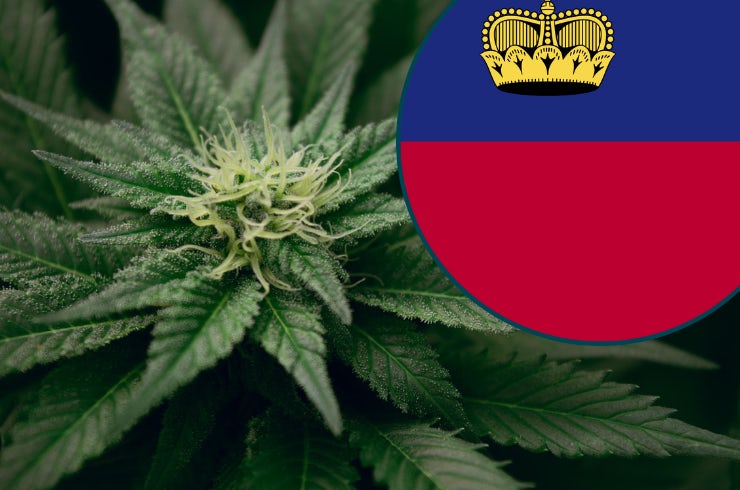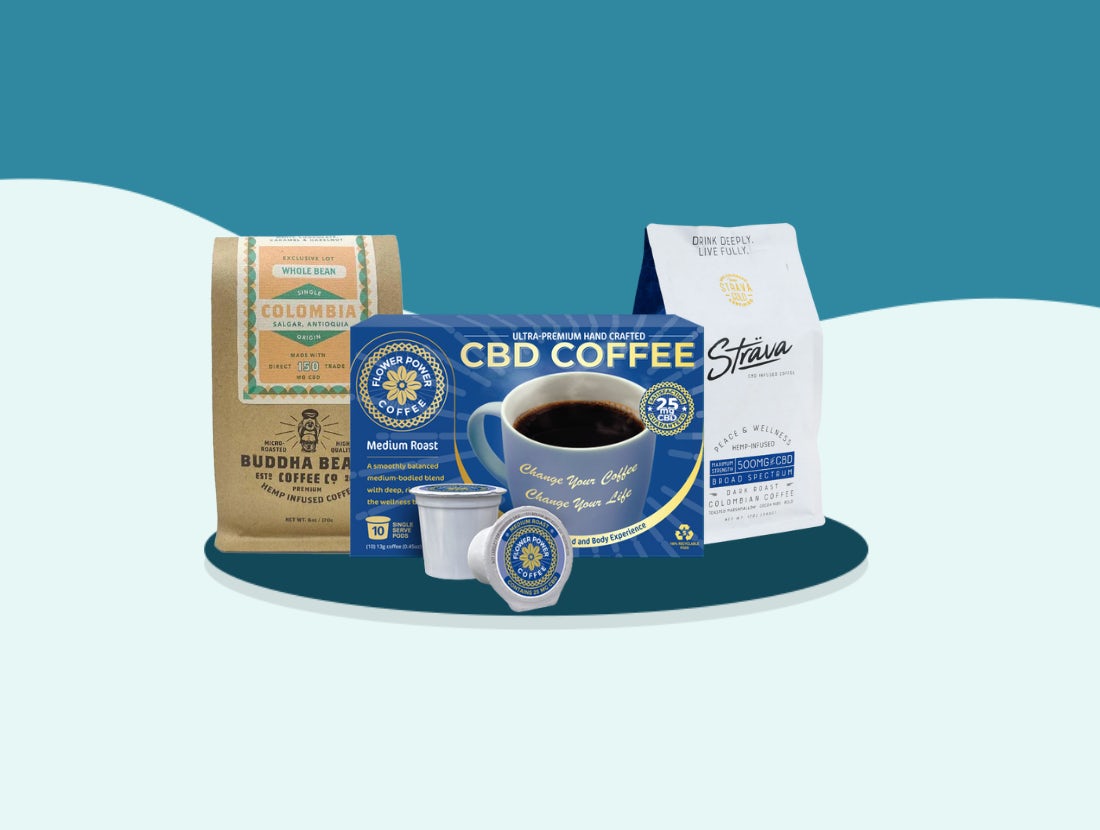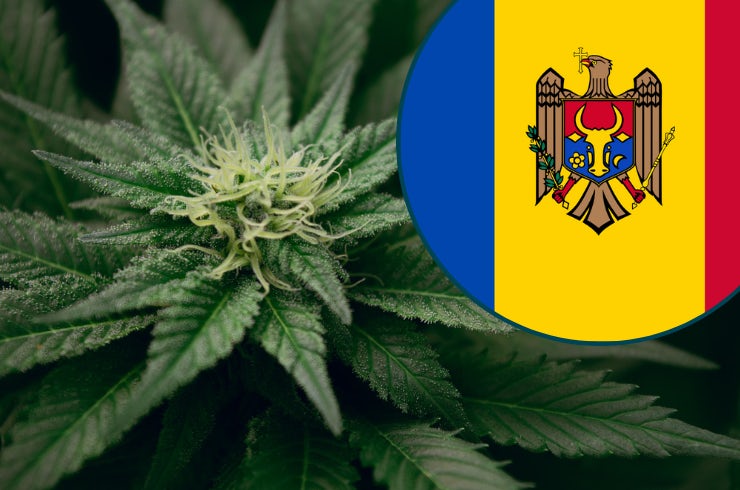The world of cannabis can be overwhelming. With so many chemical compounds, abbreviations, and consumption methods to explore, it’s hard to know where to start. But having the right information makes it easy to consume confidently.
Let’s de-mystify THCA, and look into what it does, how it differs from THC, and understand what exactly THC crystals are.
What is THCA?
THCA is one type of chemical present in the cannabis plant.
Also called Δ9-tetrahydrocannabinolic acid, or THCA, this cannabinoid is the natural acidic precursor of THC (the psychoactive cannabinoid that drives many of cannabis’ effects). Produced and stored inside of the trichomes on cannabis flowers and leaves, THCA is far more abundant in properly-dried cannabis buds than THC itself. 1
Still, with enough time or heat, THCA actually changes into THC. THCA is often called the “acid form” while THC is commonly called the “neutral” form. THCA isn’t intoxicating, and most psychoactive experiences with cannabis actually come from smoking, vaporizing or cooking THCA – heating it so that it can become psychoactive THC. 2
You may have heard of ‘decarbing’ your cannabis before cooking with it – heating it at a low heat so that it is potent or activated. This is the same process of decarboxylation – converting THCA to THC.
In addition to becoming THC, unheated THCA has its own benefits, and studies have found it may help relieve inflammation and boost metabolism. 3
THCA vs THC
The main noted difference between THCA and THC is in psychotropic effects. While THC can be extremely mind altering and disorienting, THCA does not seem to elicit the same level of psychoactivity. For this reason, some scientists have hypothesized that THCA does not activate the same receptors in the endocannabinoid system that THC does. THC is able to engage with CB1 receptors throughout the body and central nervous system – leading to many of its effects, including its psychoactivity. 4
How does THCA work?
While scientists aren’t entirely sure exactly how THCA functions, both rodent and in vitro studies actually do show that THCA can activate CB1 to some extent. Still, researchers aren’t sure why, given this, THCA doesn’t cause psychoactive effects.
Some debate whether THCA is simply unable to cross the blood brain barrier to activate CB1 receptors in the brain – or whether the activation of CB1 is simply too weak to elicit the psychoactive effect. The complex interaction of THCA with CB1 and CB2 receptors could still carry substantial medical benefits, just like other cannabinoids that do not induce a high. Regardless, THCA certainly seems to impact some receptors in the body – leading to effects like relief from pain and inflammation. 5 6
Setting aside CB1 and CB2, there are a number of other potential explanations for THCA’s beneficial effects. Scientists also found that THCA interacts with other receptors in the body including TRP ion channels and PPARs, which are heavily involved in neuroinflammation, metabolism and cellular homeostasis. 7 8
Why is THCA thought to be ‘unstable’?
THCA is just one stage in a progression. When cannabis plants are developing, they produce a chemical called CBGA. This acidic precursor is sometimes called “the mother of all cannabinoids” because it transforms into all the other acidic precursors, including THCA, and eventually THC. 9
By the time the cannabis plant is ready to harvest, there is a significant amount of THCA. But the progression isn’t finished.
As cannabis ages, or is exposed to heat or oxygen, THCA can slowly begin to transform into THC, the “neutral” form of the cannabinoid. THCA is considered unstable because without intervention, over time, it will naturally degrade into either THC or into other products. Storage conditions strongly affect how fast this happens, but one study found this rate to be about 10% per year at room temp. 10
Of course, this process can also be sped up intentionally with heat – as we see with the decarboxylation process used when smoking, vaporizing or cooking edibles. But the progression doesn’t stop at THC. With more time, heat, or light, THC can degrade further into CBN or less commonly Delta-8 THC. 11
Potential benefits of THCA
The research on THCA is limited, and few studies look at its impacts on humans, but anecdotal evidence, along with the studies that have been done, suggest that it may have some medicinal benefits. Looking at in vitro studies, scientists have found that THCA interacts with a number of molecular targets usually associated with anti-inflammatory activity.
- One study using colon tissue, found that THCA would be a better option for reducing gut inflammation for patients with inflammatory bowel diseases than CBD, another cannabinoid with known anti-inflammatory powers. 12
- Another study from 2020 in mice found THCA could be helpful for inflammation, as well as other symptoms, related to obesity-associated metabolic syndrome. Giving obese mice THCA signicantly reduced weight gain, lowered body fat, and reduced problems like glucose intolerance, insulin resistance, and liver steatosis.
Other research points to potential for THCA as an anti-cancer treatment, a drug that impacts the immune system, and a neuroprotectant for conditions like Parkinson’s disease. While none of these studies have been done on actual human subjects, the results in the lab suggest real mechanisms that could lead to positive results. And without psychoactive effects, THCA could be a much more viable treatment than THC for many of these conditions. Still, only rigorous human studies will give us the answers we truly need, to determine exactly how effective THCA may be for each of these conditions.
Finding THCA products
For those looking to find THCA products, there are more options than you may think. The primary thing to consider when finding THCA products, is whether you plan on heating the product when you consume it or not.
Heating THCA will convert it into THC. So even if these products have test results with high levels of THCA, it’s important to remember that if you smoke, vaporize or cook the product, THCA will turn into THC and become psychoactive.
Products with THCA that you would normally heat to consume include:
- Flower
- Rosin
- Concentrates
- ‘THC crystals’
For those looking to consume THCA in the raw form rather than converting it to THC, the most commonly available sources of THCA- are cannabis concentrates like wax, shatter, or rosin.
It’s also not feasible to inhale THCA, as the usual way to inhale something is to heat it. Still, if a tincture has high THCA levels on its test results, that will remain THCA when you use it orally- producing a non-psychoactive but medicinal effect.
But these products can be hard to find, so you could always make your own THCA rich product by mixing a THCA rich concentrate (like rosin) with a set amount of oil, warming gently on very low, and stirring until fully incorporated. Remove it from heat and place this in a glass jar in a cool dark place. Concentrations can vary based on how much rosin and how much oil is used.
Another popular method for consuming THCA is juicing fresh cannabis fan leaves. People who use this method tend to rave about the effects – but it requires having access to fresh fan leaves – which means either growing your own cannabis or finding a source close by where you can get fresh leaves regularly. Since this can be a challenge for the average person, tinctures are often a much more accessible option.
Are THC crystals the same as THCA?
Yes. The more accurate term for THC crystals is THCA crystalline or isolate. Unlike THCA, pure decarboxylated THC is liquid at room temperature and cannot hold a crystalline structure.
THCA crystalline are white or semi-transparent crystals isolated from the cannabis plant. They contain up to 99% THCA, making them incredibly potent. They’re odorless, flavorless, and free of all other cannabis compounds, including terpenes. Sometimes crystals can contain small amounts of terpenes or other impurities trapped inside the crystalline structure, but generally speaking these are pure crystals of THCA.
What are THCA diamonds or ‘sauce’?
THCA diamonds are yet another name for THC weed crystals because pure THCA crystals resemble the valued gemstone. This phrase is typically reserved for the THCA crystals that form is “sauce”: a type of cannabis concentrate that combines THCA with terpene-rich oil, which also contains some cannabinoids. Sauce has a thick, syrupy consistency and a flavorful taste when vaped or dabbed.
How can you use THC crystals?
THCA crystalline is a versatile cannabis concentrate that can be used in a wide variety of ways. One popular method is to dab THCA crystals directly with a dab rig, resulting in a powerful, fast-acting effect.
You can also break THCA crystals into a powder and add them to other cannabis preparations to increase their potency. For example, you could smoke or vape THCA by adding a bit of powder to a bowl, joint, or vape chamber. THC crystals can also be mixed with other concentrates, such as shatter, wax, or terp sauce.
Is THCA legal?
The legality of THCA varies by location, but it is usually simply lumped in with THC. Since THCA converts into THC when heated, cannabis testing labs often consider THCA to be a subset of THC and will report THCA levels as the THC levels they expect will be present when heated. This is in line with the US FDA regulations, and products exceeding the 0.3% THC limit on hemp could be considered breaking the law.
In order to convert from THCA percentage to ”true” THC percentage, the percentage of THCA is usually multiplied by 0.88 and that is the true percent THC. So generally, laws tend to consider THCA as THC. Whatever the laws are that govern THC in your area probably apply to THCA as well.
What are the side effects of THCA?
Given the lack of human studies on THCA, we don’t know much about the side effects. Still, anecdotal reports and research into how THCA works, suggests that it is not psychoactive and has less negative side effects than THC.
And while side effects may be limited and research too, there is reason to believe that these cannabinoid acids and other similar cannabinoid metabolites could interfere with normal drug metabolism. 13
Overall, THCA is a non-psychoactive cannabinoid with potential to help patients with inflammation and pain, and possibly act as a neuroprotectant and cancer treatment. It can be considered in patients who cannot tolerate or do not want the intoxicating effect of THC. While many currently use THCA currently for medicinal benefits, more research is needed to fully understand how to utilize it.
Sources
- Moreno-Sanz G. (2016). Can You Pass the Acid Test? Critical Review and Novel Therapeutic Perspectives of Δ9-Tetrahydrocannabinolic Acid A. Cannabis and cannabinoid research, 1(1), 124–130. https://doi.org/10.1089/can.2016.0008
- Sumner H Burstein,The Cannabinoid Acids: Nonpsychoactive Derivatives with Therapeutic Potential, Pharmacology & Therapeutics, Volume 82, Issue 1,1999,https://doi.org/10.1016/S0163-7258(98)00069-2.
- Belén Palomares, Francisco Ruiz-Pino, Martin Garrido-Rodriguez, M. Eugenia Prados, Miguel A. Sánchez-Garrido, Inmaculada Velasco, María J. Vazquez, Xavier Nadal, Carlos Ferreiro-Vera, Rosario Morrugares, Giovanni Appendino, Marco A Calzado, Manuel Tena-Sempere, Eduardo Muñoz, Tetrahydrocannabinolic acid A (THCA-A) reduces adiposity and prevents metabolic disease caused by diet-induced obesity, Biochemical Pharmacology, Volume 171, 2020, 113693, https://doi.org/10.1016/j.bcp.2019.113693.
- Moreno-Sanz G. (2016). Can You Pass the Acid Test? Critical Review and Novel Therapeutic Perspectives of Δ9-Tetrahydrocannabinolic Acid A. Cannabis and cannabinoid research, 1(1), 124–130. https://doi.org/10.1089/can.2016.0008
- McPartland, J. M., MacDonald, C., Young, M., Grant, P. S., Furkert, D. P., & Glass, M. (2017). Affinity and Efficacy Studies of Tetrahydrocannabinolic Acid A at Cannabinoid Receptor Types One and Two. Cannabis and cannabinoid research, 2(1), 87–95. https://doi.org/10.1089/can.2016.0032
- Raïch, I.; Rivas-Santisteban, R.; Lillo, A.; Lillo, J.; Reyes-Resina, I.; Nadal, X.; Ferreiro-Vera, C.; de Medina, V.S.; Majellaro, M.; Sotelo, E.; et al. Similarities and differences upon binding of naturally occurring Δ9-tetrahydrocannabinol-derivatives to cannabinoid CB1 and CB2 receptors. Pharmacol. Res. 2021, 174, 105970.
- Nadal X, Del Río C, Casano S, et al. Tetrahydrocannabinolic acid is a potent PPARγ agonist with neuroprotective activity. Br J Pharmacol. 2017;174(23):4263-4276. doi:10.1111/bph.14019
- Muller C, Morales P, Reggio PH. Cannabinoid Ligands Targeting TRP Channels. Front Mol Neurosci. 2019;11:487. Published 2019 Jan 15. doi:10.3389/fnmol.2018.00487
- Wang, M., Wang, Y. H., Avula, B., Radwan, M. M., Wanas, A. S., van Antwerp, J., Parcher, J. F., ElSohly, M. A., & Khan, I. A. (2016). Decarboxylation Study of Acidic Cannabinoids: A Novel Approach Using Ultra-High-Performance Supercritical Fluid Chromatography/Photodiode Array-Mass Spectrometry. Cannabis and cannabinoid research, 1(1), 262–271. https://doi.org/10.1089/can.2016.0020
- John M. McPartland, Christa MacDonald, Michelle Young, Phillip S. Grant, Daniel P. Furkert, and Michelle Glass.Cannabis and Cannabinoid Research.Dec 2017.87-95.http://doi.org/10.1089/can.2016.0032
- Golombek P, Müller M, Barthlott I, Sproll C, Lachenmeier DW. Conversion of Cannabidiol (CBD) into Psychotropic Cannabinoids Including Tetrahydrocannabinol (THC): A Controversy in the Scientific Literature. Toxics. 2020; 8(2):41. https://doi.org/10.3390/toxics8020041
- Rameshprabu Nallathambi, Moran Mazuz, et al. Anti-Inflammatory Activity in Colon Models Is Derived from Δ9-Tetrahydrocannabinolic Acid That Interacts with Additional Compounds in Cannabis Extracts. 1 Jul 2017 https://doi.org/10.1089/can.2017.0027
- Nasrin S, Watson CJW, Perez-Paramo YX, Lazarus P. Cannabinoid Metabolites as Inhibitors of Major Hepatic CYP450 Enzymes, with Implications for Cannabis-Drug Interactions. Drug Metab Dispos. 2021;49(12):1070-1080. doi:10.1124/dmd.121.000442
Sign up for bi-weekly updates, packed full of cannabis education, recipes, and tips. Your inbox will love it.

 Shop
Shop Support
Support